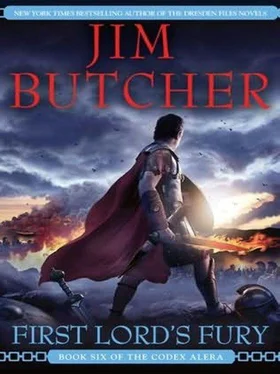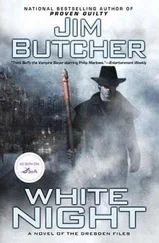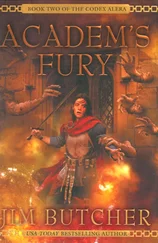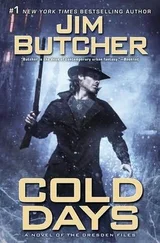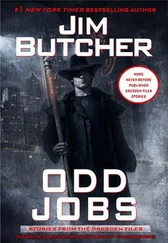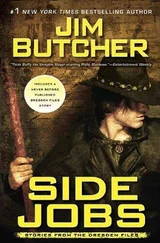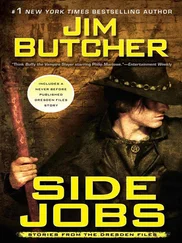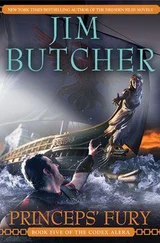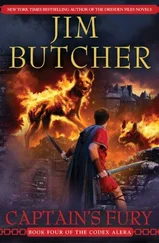“Better now,” Fidelias told him. “I feel like a new man.”
“That’s because you’re sandbagging it, slacker,” Durias said. “You’re going to miss that armor tomorrow morning.”
Fidelias grinned easily. “That’s a long time from now. Besides, I don’t see you walking and letting some poor legionare have a turn on horseback.”
Durias sniffed. “Rank has its privileges,” he said piously. “I go letting some random legionare ride while the First Spear takes his place, I’m upsetting the natural order of the Legion. Bad for morale. Totally irresponsible.”
“Good, kid,” Fidelias said. “You’ll make officer yet.”
Durias grinned. “Take that back.”
A Tribune of the Free Aleran rode up to them and threw Durias a salute. His armor, though standard Legion lorica, was old and worn, if obviously currently in good maintenance, and scoured free of any insignia whatsoever. “First Spear.”
“Tribune,” Durias said, returning the salute. “Report.”
“Four more contacts with the enemy, all of them with the wax spiders. We also burned out another half a dozen patches of the croach . They like to start it around the edges of a pond whenever they can. They’re getting easier to find.”
“That means that the well-hidden patches will be that much more difficult to spot,” Durias said. “Don’t ease up on them.”
The officer let out a rueful laugh. “Not bloody likely.” He eyed Fidelias. “How’s he doing?”
“He feels like a new man,” Durias said.
“He looks like a lazy man.” The officer leaned a bit to one side to peer around Durias at Fidelias. “Story is you shot at the vord Queen.”
“Didn’t shoot at her,” Fidelias said. “I shot her. With a balest, no less. The bolt bounced right off her.”
The officer lifted his eyebrows. A balest bolt could pass through a horse and fatally wound an armored legionare on the other side. “How far out were you?”
“Twenty yards, maybe,” Fidelias said.
The officer stared at him for a moment. Then he fretted his lip and eyed Durias. “And we’re chasing that ? This is pointless. This Princeps is going to get us all k—”
Durias dug one heel abruptly into his horse’s flank, and the beast lurched forward and to one side, slamming its shoulder against the Tribune’s mount. Durias’s hand flashed out and seized the man by the plates of his lorica, half-dragging him from the horse.
“ Legionares complain,” Durias said in a harsh, low voice. “Officers lead. Shut your bloody mouth and lead. Or if you can’t do that, have the balls to resign your commission and let someone who isn’t a bloody coward do your job.” He didn’t give the officer time to respond. He just shoved him, stiff-armed, away.
The officer recovered his balance and control of his horse, his face chagrined. “Aye. Aye. We’ll get back to work.”
Durias grunted and said nothing. The officer saluted and turned to ride away. Durias turned to Fidelias, a belligerent gleam in his eyes. “Well?”
Fidelias pursed his lips and nodded. “Not bad.”
From the head of the column, not far away, trumpets began to blow assembly. The water break was over.
Men and Canim began to return to the causeway, walking in pairs of one Cane to one Aleran, moving wearily. They assembled into a column.
“We’re going to get there exhausted,” Durias said quietly. “On open ground. No fortifications.”
Fidelias took a slow breath, and said, “If the Princeps must sacrifice us all to give him a chance to take down the Queen, he should do it. I would. In a heartbeat.”
“Yes,” Durias said, even more quietly. “I suppose that’s what is bothering me.”
“First Spear,” Fidelias said. “Shut up and lead.”
Durias let out a snort of bitter amusement. “True enough.” The two exchanged a salute, and Durias turned to ride back toward the Free Aleran’s section of the column.
The second trumpet signal came—the normal cavalry call to mount up. Fidelias stopped to watch the nearest legionares . Each of them carried a pair of long, wide canvas straps, cut from the cloth of their tents. A loop in the cloth had been tied in one end. The legionares stepped behind their Canim partner and slipped their boots into the loops. Then they passed the straps to the Cane before them.
After that, there was a bit of scrambling as the Canim slid the straps over their own shoulders, wrapped their other ends about their paw-hands, and crouched as their Aleran partners clambered up onto their backs, the straps becoming makeshift stirrups, the Alerans taking on the role of human back-packs. Men occasionally fell. Canim occasionally were kicked in inconvenient (and unarmored) places. Several tails, particularly, seemed to be put in harm’s way in service to the Princeps’ novel concept in transportation.
Other legionares , Fidelias knew, were now mounting up behind taurg cavalry riders, and doing just as much complaining. But when the trumpet sounded again, the Canim began to work up to their loping overland pace, then even faster, running without difficulty as the Aleran partners bid the furies of the causeway to help them. Not a single Aleran was touching the causeway with his own feet. The Canim’s greater natural speed meant that they could use the causeway to move almost as swiftly as a good horse. Within minutes, the entire column was on the move again, miles vanishing beneath Canim feet. They were making faster progress than any Legion would have made marching alone.
Fidelias began to guide his horse back toward the front of the column as they marched, trying very hard not to think about what the Free Aleran Tribune and its First Spear had said about their prospects for surviving another day.
“Shut up, old man,” he breathed to himself. “Shut up and face it head-on.”
He pursed his lips and thought about a different portion of the previous conversation. Then he barked a short laugh to himself.
Whatever might happen in the next day or so, one thing remained true: Fidelias did feel like a new man—and it would not be long before the scales of his life were finally balanced.
Soon, he told himself.
Soon.
Isana sat at the silently entombed Araris’s feet, her hands folded in her lap, watching the vord Queen command her brood. The Queen stood in the alcove, staring up at the green-lighted ceiling, her eyes seemingly unfocused and far away. The light of sunset added the barest hint of yellow to the croach that grew near the entrance to the hive.
“The defenses at the final position are quite cohesive,” the Queen said abruptly. “They are very nearly as formidable as those in Shuar, and the counter-strikes far more effective.”
Isana frowned, and asked, “Shuar?”
“The hive of a subspecies of the Canim. A particularly tenacious strain of the breed. Their fortifications had withstood siege for more than a year when I left Canea.”
“Perhaps they withstand it still.”
The vord Queen looked down at Isana, and said, “Unlikely, Grandmother. The presence of Shuaran Canim in your son’s expeditionary force would suggest that they are refugees, cooperating because they have no other choice.” She turned her face back up to the ceiling. “Though it is far too late, at this point. A unified resistance might have stopped us several years ago, but you were all quite busy exhibiting the most glaring weakness of individuality: self-interest.”
“You see self-identity as a weakness?” Isana asked.
“Obviously.”
“Then one cannot help but wonder why you have one.”
The Queen looked at Isana. The vord’s alien eyes were narrowed. She was silent for a long moment before she looked back up, and answered, “I am defective.” Green light flowed down over her upturned face for a time before she said, “I ran a poisoned sword through your son’s intestinal tract yesterday evening.”
Читать дальше
